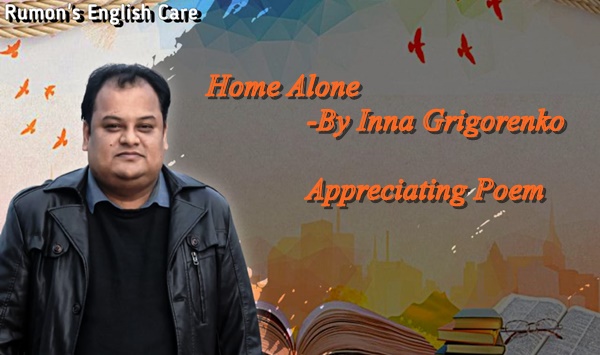Home Alone -By Inna Grigorenko
Home Alone
-By Inna Grigorenko
My family’s gone; there’s no one home.
It’s only me who’s home alone.
I shouldn’t hear a single squeak.
There shouldn’t even be a creak,
So what’s that thumping that I hear?
It must mean one thing: death is near.
“You’re an adult, you’ll be just fine.”
I tell myself as I dial “nine”…
Was that a knock upon the door?
My heart beats faster than before
I know it’s closed; I’ve checked the lock.
At least my killer knows to knock?
I cannot sleep, though I’m in bed.
I’ve made amends with God instead.
If He decides that it’s my time,
Then this will be my very last rhyme.
I hear a bang and then a break.
My head shoots up; there’s no mistake!
I turn my music volume high
So I won’t hear the way I die.
I run upstairs, desk lamp in hand.
Over my head, ready to land,
And right before it did just that..
I remembered – I have a cat
Bengali Translation
আমার পরিবার চলে গেছে; বাড়িতে কেউ নেই।
বাড়িতে শুধু আমিই একা।
আমি একটি একক চিৎকার শুনতে হবে না.
এমনকি একটি ক্রিক হওয়া উচিত নয়,
তাই কি যে বচসা আমি শুনতে পাই?
এর অর্থ অবশ্যই একটি জিনিস: মৃত্যু নিকটে।
“আপনি একজন প্রাপ্তবয়স্ক, আপনি ঠিক থাকবেন।”
আমি “নাইন” ডায়াল করার সাথে সাথে নিজেকে বলি…
এটা কি দরজায় টোকা পড়ল?
আমার হৃদস্পন্দন আগের চেয়ে দ্রুত
আমি জানি এটা বন্ধ; আমি তালা চেক করেছি।
অন্তত আমার ঘাতক নক করতে জানে?
আমি ঘুমাতে পারি না, যদিও আমি বিছানায় আছি।
আমি পরিবর্তে ঈশ্বরের সাথে সংশোধন করেছি.
যদি তিনি সিদ্ধান্ত নেন যে এটি আমার সময়,
তাহলে এটাই হবে আমার শেষ ছড়া।
আমি একটি ঠুং শব্দ এবং তারপর একটি বিরতি শুনতে.
আমার মাথা উঠে যায়; কোন ভুল নেই!
আমি আমার সঙ্গীত ভলিউম উচ্চ চালু
তাই আমি যেভাবে মরব তা শুনব না।
আমি দৌড়ে উপরে, ডেস্ক ল্যাম্প হাতে।
আমার মাথার উপরে, অবতরণ করার জন্য প্রস্তুত,
এবং ঠিক আগে এটা ঠিক যে..
মনে পড়ল- আমার একটা বিড়াল আছে
(a)Answer the following questions: 2×3=6
i) Why shouldn’t the poet hear even a sound in her home?
ii) What was the poet afraid of?
iii) Who actually did the sound?
(b)How many stanzas are there in the poem? 1×1=1
(c) Write the rhyming words in the following table. 0.5×6=3
| ————- | creak |
| hear | —————- |
| ————— | nine |
| ————— | knock |
| high | ————– |
| mind | ————– |
(d) Write the summary of the poem.
Answer:
(a)
(i) The poet shouldn’t hear even a sound in her home because she has no other family member in her home.
(ii) The poet was afraid of death.
(iii) Actually a cat did the sound.
(b) There are six (6) stanzas in the poem
(c)
| squeak | creak |
| hear | near |
| fine | nine |
| lock | knock |
| high | die |
| mind | land |
(d) This poem was so funny. It was also a little scary because he thought he was going to die, but then he remembered he had a cat. We often let our minds wander, making a situation seem worse than it is. This poem is a reminder that things aren’t always as bad as they seem.

